Russian Athletes Edge Japan for Men's Gymnastics Gold Medal

TOKYO — In the instant before the judges announced the winner, Russian and Japanese men’s gymnasts were united by two thoughts: This was the longest instant of all time, and Japan would win.
Nikita Nagornyy, of Russia, believed officials would put their thumb on the scale for the home country. Takeru Kitazono, of Japan, was certain that his teammate Daiki Hashimoto had nailed his horizontal bar routine beyond what Nagornyy could match on the floor.
They were both wrong. The timing of the routines meant that Nagornyy knew before he began that he needed a 14.564 to push his team to gold. He made a mistake on his third pass and ended up with a back double full instead of the planned Rudi. He was supposed to do a back double full later, but he knew repeating the element would be a violation, so he improvised and added a triple full in its place.
“I had to adjust,” he said through an interpreter.

It was enough. As nearly everyone in the Ariake Gymnastics Center looked on, agape, the judges awarded him 14.666 points. Russia took first place over Japan, 262.500 to 262.397. It was the first time an Olympic team final had been that close since the International Gymnastics Federation changed the scoring system in 2006. China finished third, followed by Great Britain and then the United States. It was the U.S.’s third straight fifth-place finish.
Nagornyy’s improvisation might not even have mattered if not for Artur Dalaloyan, who tore his left Achilles’ tendon in April. He did not plan to compete, he said, but he met with his team and coach and changed his mind. “I felt the strength and power to compete,” he said. He landed nearly every routine.
They were all giddy afterward, weeping and struggling to put on one another’s medals.
“We saw the forecast for the typhoon,” Nagornyy said. “Don’t worry. The storm already came. We won the gold medal.”
Technically, the victory belonged to the Russian Olympic Committee, as Russia has been banned from international competition until 2022 because of widespread doping. The athletes wore ROC unitards, faced the ROC flag during the medal ceremony and listened to a few bars of Tchaikovsky rather than their anthem. That technicality did not seem to bother them. They knew that they had earned Russia’s first men’s gold medal since Alexei Nemov won the all-around and the horizontal bar in '00, and first team title for either gender since the men won in 1996.
Meanwhile, the Japanese squad tried to process the results.

“I really thought that we had won,” said Wataru Tanigawa. Hashimoto acknowledged afterward a sliver of doubt, but he celebrated his bar routine as if he had clinched gold for his team. There were no fans here, but his teammates cheered his every move on the bar and erupted as he stuck the landing. Then he pranced around the floor, thrusting his arms into the air to hype up the few people, mostly other gymnasts and officials, allowed inside. They gave him an ovation.
This was an emotional week for the Japanese team, made up of all Olympic rookies. Kōhei Uchimura, a seven-time Olympic medalist who is considered the greatest male gymnast ever, entered these Games as an individual event specialist in the horizontal bar. King Kohei, 32, fell during the qualifying round, ending his career on a disappointing note.
“I’m past my peak,” he said afterward. “I just have to accept that calmly.” But he heaped praise upon the team, some of whom became gymnasts because they so adored him. “They're just amazing. For their first Olympics, they're almost too amazing for words,” he said. “When I came back to the floor after my performance, they were getting together, discussing things and solving problems by themselves. I don't think I'm needed by them anymore.”
The team’s future is bright. They made no major errors Monday. Head coach Hisashi Mizutori said that he had expected 262.397 to be good enough for gold. Indeed. The Russians had, too.
More Olympics Coverage:
